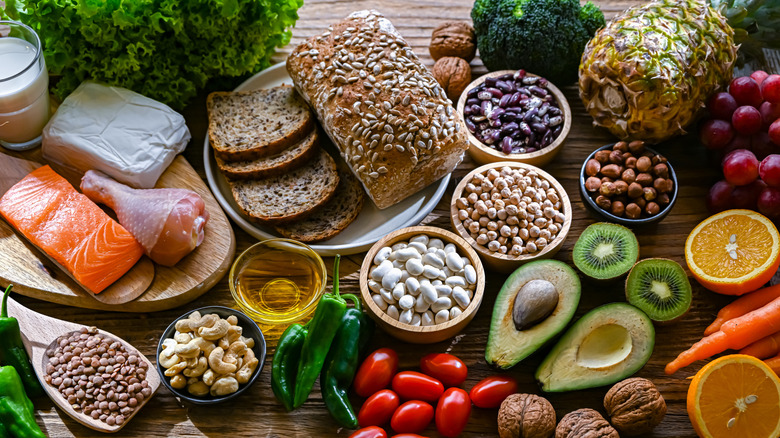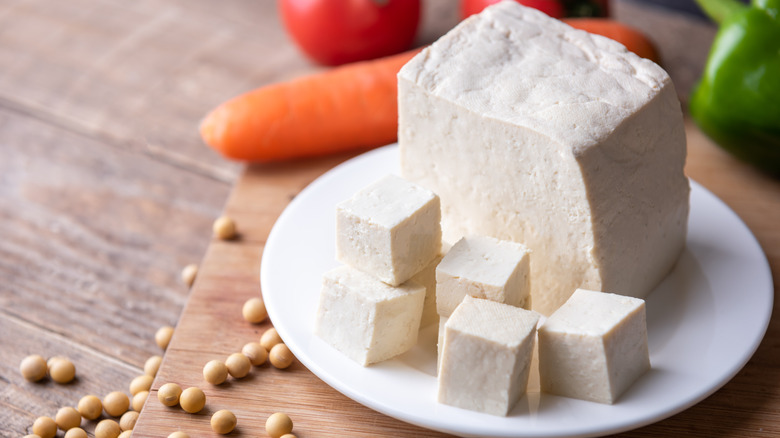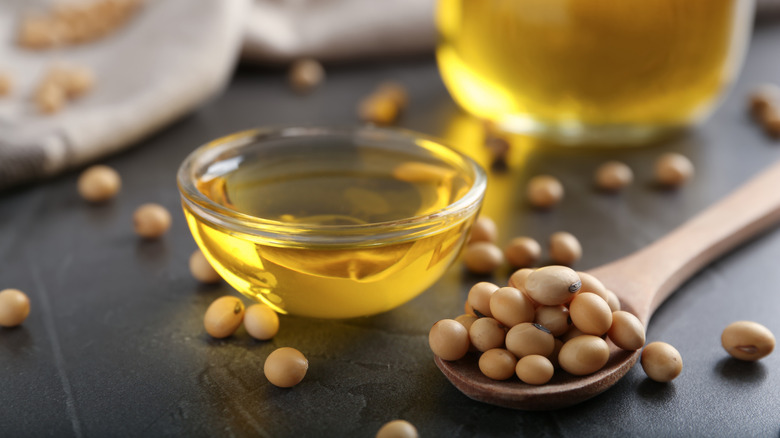10 Myths About Soy You Should Really Stop Believing
You may have heard conflicting information about soy. Sometimes it's praised as a healthy plant-based alternative to meat. But other times, you may have been told that eating soy is bad for you. Soy has been the scapegoat for many problems for decades. It's been falsely blamed for reducing mineral absorption, causing children to go into early puberty, and increasing infertility in women. The dairy industry is even lobbying to have the term "soy milk" and other plant-based milks no longer labeled as "milk."
Experts tell us that soy is high in fiber, potassium, protein, and iron. Most plant-based proteins contain some amino acids, but soy is a complete source of protein – you can even use soybeans to boost the protein content of your hummus. Unlike meat, soy has no cholesterol. It's been associated with lowering blood pressure. But what about its hormonal effects? Can soy really affect fertility, increase the risk of breast cancer, or cause dementia? Let's take a look at how some of the most prevailing myths stand up to the science.
Myth #1: Soy is not a healthy protein
Plant-based proteins have gained in popularity in recent years. However, America's meat-eating traditions go back so far that it's hard for some people to believe a plant can provide healthy protein. Most dietitians agree that soy foods are actually healthy sources of protein. Eating foods such as tofu, miso, edamame, and tempeh provides high-quality protein to your diet. For example, one cup of shelled edamame contains about 18 grams of protein, and a 3.5-ounce serving of tofu contains around 17 grams of protein.
Beyond being protein-rich, soybeans contain sufficient amounts of all nine essential amino acids (EAAs), making them a complete protein on par with animal products. If you'd like to sneak some soy protein into your meals, there are plenty of ways. One idea is to add silken tofu to smoothies. Silken tofu is the perfect texture to add to a creamy smoothie, but it doesn't have much flavor and won't alter the taste. Other ideas include snacking on edamame, shelling them and adding them to salads, swapping out dairy milk for soy milk (the plant milk with the most protein), or using soybean pasta instead of traditional wheat pasta.
Myth #2: Soy causes breast cancer
The myth that eating soy can increase your risk of breast cancer came from a misunderstanding about how isoflavones work. Soy contains isoflavones, which are compounds known as phytoestrogens. Isoflavones come from plants and have a similar structure to human estrogen, but they don't function in the same way that estrogen does in the body. According to the American Institute for Cancer Research, not only have early concerns about soy foods being linked to breast cancer been debunked, but studies have also shown the isoflavones in soy may actually work to help reduce the risk of breast cancer. The institute also says that it's safe to eat soy foods as part of a healthy diet even after receiving a diagnosis of breast cancer.
Some of the previous research regarding soy and breast cancer involved studies with rodents. We have since learned that mice break down soy isoflavones differently than humans do. Additionally, the mice in the studies were given much higher levels of isoflavones than a person would get through their diet. A meta-analysis of research, published in the peer-reviewed journal In Vivo, found that soy isoflavones may reduce the risk of breast cancer in premenopausal and postmenopausal women. And a joint report from the World Cancer Research Fund and the American Institute for Cancer Research noted that limited evidence exists to suggest that those diagnosed with breast cancer who ate a diet high in fiber or soy had a lower risk of dying sooner.
Myth #3: Eating soy prevents mineral absorption
This misconception about mineral absorption arises from the fact that soy, like all edible seeds, contains compounds called phytates. Sometimes known as anti-nutrients, phytates occur in plant-based foods such as nuts, grains, legumes, and seeds. The problem with phytates is that they have been found to block the absorption of certain minerals like calcium, zinc, and iron. But for one thing, this only affects the current meal you are eating and won't have lasting effects throughout the day. For example, if you snack on nuts between meals, the phytates in the nuts could block absorption of minerals from those nuts, but they won't affect the dinner you may eat a few hours later.
Phytates can be broken down by cooking and fermenting. When you soak beans in water, you reduce phytate levels. Sprouting also reduces phytate levels in soy products. A review published this year in the journal Advances in Nutrition noted that vitamin C can make iron in plant-based food easier to absorb. In practical terms, adding a citrus vinaigrette, for example, can help with the absorption of iron from edamame, the veggie all vegans should have in their freezer.
One other thing to consider is that dieticians say Americans have little to worry about when it comes to mineral deficiencies. As long as you are eating a well-balanced diet and getting your recommended dietary allowances, you don't need to be concerned with phytates found in soy foods or any other plant-based food.
Myth #4: Soy-based infant formulas are unhealthy for babies
The American Academy of Pediatrics (AAP) recommends that breastfeeding is best for babies. However, once babies are about 2 months of age, many parents in North America begin to supplement with formula at least some of the time. Some babies aren't able to tolerate cow's milk-based formulas. Pediatricians often recommend soy-based formula for babies who need an alternative to dairy. Formulas made with soy have the same amount of nutrients and calories to meet a baby's nutritional needs. But some people have expressed concern that soy isoflavones can be harmful to a baby's development.
As we mentioned previously, soy isoflavones have a similar structure to estrogen. However, these plant compounds don't act the same way in the body as estrogen does. Furthermore, studies have shown no long-term effects from drinking a soy-based formula as infants. The AAP recommends giving babies soy-based formulas when they have hereditary disorders that may prevent them from safely drinking cow's milk.
Myth #5: Soy is bad for your thyroid
Early research revealed possible links between soy consumption and thyroid function. However, many of those studies were flawed or based on how soy isoflavones affected rodents. They did not replicate how the compounds in soy react in the human body. According to data compiled in Critical Reviews in Food Science and Nutrition, "The available evidence indicates that isoflavone intake does not adversely affect thyroid function." A separate review of research published in Scientific Reports also found no effect on thyroid hormones when consuming soy.
But what if you have been diagnosed with a thyroid condition? Is it safe to eat foods containing soy? The Cleveland Clinic explains that studies have shown that consuming a large amount of soy before or after taking thyroid medication can interfere with the absorption of the medicine. But that doesn't mean you need to avoid eating soy foods altogether. The clinic recommends that you avoid eating any food with soy in it for a few hours before and a few hours after taking thyroid medicine to avoid any issues with absorption. Check with your doctor if you're concerned about eating soy and you have a thyroid condition.
Myth #6: Soy causes infertility
The idea that consuming soy could affect fertility comes from its high content of isoflavones (plant-derived estrogens). A review of scientific literature in The Journal of Nutrition in 2010 suggested that a typical diet that included soy did not contain enough isoflavones to affect fertility but that consumption of large quantities could interfere with female ovarian functioning. However, the levels noted in the article exceeded 100 milligrams of isoflavones a day. That would be equivalent to drinking about four cups of soy milk, according to an article in Nutrients.
A separate review in 2022 in the Journal of Nutritional Science found that eating soy may be beneficial during pregnancy and also doesn't hurt a healthy woman's chances of becoming pregnant. That article explained that although soy does contain isoflavones, it also contains many other phytochemicals and bioactive substances. Scientists need to do more research to understand how all the different compounds in soy may react together in the human body. As the researchers explained in the paper's discussion, "the effect of soy cannot be attributed to the effect of its isoflavones alone."
But how much soy is too much? According to the San Diego Fertility Clinic, it would take consuming 60 grams of soy protein a day for more than a month to affect a person's hormones. One cup of edamame contains 18.5 grams of soy protein. A half cup of tofu (which essentially is bean curd, a byproduct of soybeans) contains nearly 22 grams of protein. As you can see, you would have to eat a lot of soy to experience changes to your hormones and fertility.
Myth #7: Soy affects male reproductive hormones
There have been warnings over the years by some that consuming soy foods could cause a "feminization" in men. The idea comes from the isoflavones in soy that cause estrogen-like effects. The concern was that if men ate too much soy, the isoflavones involved would affect their hormones, causing everything from losing muscle tone to growing breasts. But, as it turns out, this is not true.
Many of the studies that led to this conclusion have been mainly discounted as either being performed on rodents, which don't absorb soy protein in the same way as humans, or involving very small sample sizes. A 2011 case report published in Nutrition explored the health issues of one man who followed a vegan diet with large amounts of soy.
However, a 2021 meta-analysis of clinical studies, as reported in Reproductive Toxicology, revealed that consuming soy had no effect on male hormone levels. In the studies, soy isoflavones did not affect men's levels of testosterone or estrogen. According to experts, men can safely eat soy foods and get all the health benefits from soy protein without any concerns that it will alter their male hormones.
Myth #8: Soybean oil is toxic
It's not just soybean oil that has a bad reputation. All seed oils, such as canola, sunflower, and soybean, have been maligned in some areas of the internet for at least the past 10 years. And they're taking even more hits recently, not just from online wellness gurus, but from politicians as well. Seed oils are made by extracting the oil from seeds, usually by crushing them. Next, the oil is processed with heat or chemicals to remove cloudiness and give it a neutral flavor. Seed oils are popular for cooking because of their neutral flavor and high smoke points. Soybean oil has such a high smoke point that it's ideal for frying. That makes it popular in restaurants. It's also good for businesses because extracting seed oils is much cheaper than processing olive oil or avocado oil.
But where did the bad reputation come from? Martha Belury, Ph.D., a registered dietitian and food science professor at The Ohio State University, told MedPage Today earlier this year that the misinformation comes from a misunderstanding of the science: "Seed oils do not increase acute or chronic inflammation markers," she said. Of course, eating a lot of fried foods, whether in soybean oil or some other type of oil, can be harmful to your health. Soybean oil, like other oils, should be consumed in moderation. Soybean oil can be a source of heart-healthy fats when you don't overconsume.
Myth #9: Soy causes dementia
There is growing evidence suggesting that eating a diet that regularly includes highly processed foods can lead to cognitive decline. However, the evidence for consuming soy is different. There have been a few studies in the past suggesting a link between soy foods and Alzheimer's dementia. But, more recent research has shown the opposite. One study conducted in Japan and published in Alzheimer's & Dementia linked a diet high in soy with less cognitive decline. Whether or not soy is beneficial for brain health needs to be studied more, but experts have concluded that eating soy can be part of a healthy diet with no risk of increasing the chance of dementia.
Soy is recommended by doctors as a healthy protein alternative to people trying to eat less red meat. On the other hand, processed red meats have been shown to increase the risk of dementia. While there needs to be more studies done to determine whether eating soy can improve cognitive function, there is no conclusive evidence that it's damaging to brain health.
Myth #10: Soy causes early puberty
The onset of puberty is starting earlier, having dropped about three months per decade since the 1970s. Despite all the research, scientists have not been able to figure out what's causing earlier puberty. For over a decade, some have suggested that perhaps consuming too much soy leads to early puberty. A 2015 blog post in Psychology Today addresses those concerns, stating, "Given that soy is an excellent source of protein in a balanced diet, we think that whole soy foods are a good choice for developing children, both boys and girls." In fact, soybeans are the legumes with the highest amount of protein. However, the myth persists that eating soy may lead to early puberty. But what does the research say?
According to a meta-analysis published in 2021 in PLOS ONE, researchers from São Paulo State University showed no link between feeding babies soy-based infant formula and the early onset of puberty. In fact, eating soy protein has been found to have beneficial effects on children. A recent study on school-age children reported in the American Society for Nutrition showed that eating soy may have a positive effect on thinking abilities and attention span. Dr. Kelly Fradin, Chair of Pediatrics at the Atria Health and Research Institute, told CNBC soy can be a healthy part of a child's diet. "Soybeans in particular have a good amount of healthy fats in them, like omega 3 and omega 6 fats that support heart and brain health," she said.










